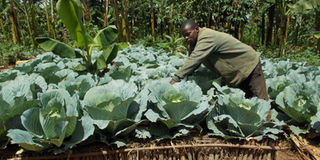Prime
Farming helped Lutabi overcome hardships

Cabbages enable him earn a daily income. PHOTO BY MICHAEL J SSALI
What you need to know:
- William Lutabi lost both his parents as a young boy and dropped out of school in his teens.
- With learning how to farm, he has overcome hardships and is on the way to prosperity.
- He shared his story with Michael J Ssali
William Lutabi, a resident of Butale B village in Kabonera Sub-county, Masaka District, lost both parents when he was an infant and had to be taken care of by his grandparents.
However, after he completed primary school, they could not afford to take him to secondary school due to financial difficulties.
“I was 14 years old then and I had done my Primary Leaving Exams at Kikungwe Primary School,” he recalled.
“I was told by a friend that boys like myself had an opportunity to be trained to carry out profitable organic farming in small gardens.”
Training
Most of them had lost their parents to HIV/Aids and an anti-Aids Catholic NGO, Kitovu Mobile, was sponsoring the training in the farming skills, which lasted several months.
“The training was conducted in a camp set up on my former school’s compound. After training us for a certain period, they (the trainers) would visit our homes to see if we were growing crops the way we had been taught,” Lutabi narrates.
“Then we would go back for further training until we mastered most of the skills.”
When Seeds of Gold visited his home a few weeks ago, he was busy attending to a garden of cabbages where he expected to harvest about 400 large cabbages.
Use of space
He points out that for anybody farming on a small piece of land, the easiest way to make money is to grow vegetables like cabbages.
“A small garden of vegetables normally produces enough to keep selling to my customers and it is easy to practice irrigation if the rains fail,” he said.
“It is also easier to get organic manure for a small garden measuring tens of square metres.”
Lutabi has a heap of soil in the courtyard on which he grows about 100 cabbages.
In addition to this courtyard garden, there were other small gardens in the compound which have different types of vegetables. These range from nakati, dodo, sukuma wiki, jjobyo to spinach, tomatoes, and a whole range of others. Also, he grows some of the vegetables on sacks of soil.
How planning helps
“Vegetables take a short time to be harvested and it is possible to grow them according to available market demands as long as irrigation is done during times when rain is scarce,” Lutabi says.
“I have to make sure that there are vegetables for me to sell all the time. This has to do with good planning in regard to when to plant particular vegetables and when they are expected to be harvested.”
Most of his customers have restaurants in the nearby trading centres and the vegetables are on demand all year round.
The prices tend to go up during the dry season because most of the other farmers find it harder to produce them without carrying out irrigation.
Banking the proceeds
It was as a result of his daily income from vegetables over the years that he was able to acquire his first Friesian cow some five years ago.
The cow became his permanent source of animal manure and it gives him more than 15 litres of milk per day. He has since added another to make two cows on the farm.
“I had to open a savings account with Centenary Bank since I discovered I could not keep all the money that I was earning in the house.”
He is lucky to live near a permanent source of water in the valley from where he gets all the water he needs for his farming activities.
Other enterprises
To prepare the vegetable garden he makes sure the soil is well mixed with cow dung before he plants the seedlings. Mulching is done right after the seedlings have been planted.
Lutabi has his own vegetable nurseries. To control pests, he mostly uses a concoction of hot pepper and cattle urine mixed with water.
In addition to vegetables, he grows other crops including pineapples, Robusta coffee, maize and bananas.
Satisfied farmer
He grows his own fodder grass along the edges of his grandfather’s piece of land.
“Sometimes when my own fodder runs out I look for some, out there in the forest,” he said.
His grandmother passed away a few months ago and Lutabi, who is not yet married, lives with his widower grandfather and three other relatives.
“I am happy to be doing this kind of work because I am able to take good care of my ageing grandfather. We also have a regular income in the home and we have enough food to eat,” he says contentedly.
To note
Growing your own vegetables is both fun and rewarding. All you really need to get started is some decent soil and a few plants. But to be a really successful vegetable gardener — and to do it organically — you will need to understand what it takes to keep your plants healthy and vigorous.
Although various fertilisers and mineral nutrients (agricultural lime, rock phosphate, greensand, etc.) should be added periodically, by far the most useful substance for building and maintaining a healthy, well-balanced soil is organic matter.You can add organic matter to your soil many different ways, such as compost, shredded leaves, animal manures or cover crops.
Source: Gardeners




